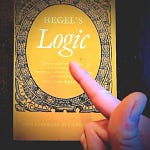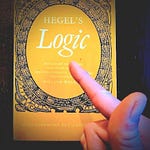"When it is carried out to its legitimate consequences, Empiricism — being in its facts limited to the finite sphere — denies the super-sensible in general, or at least any knowledge of it which would define its nature; it leaves thought no powers except abstraction and formal universality and identity …
And all the while it is unaware that it contains metaphysics — in wielding which, it makes use of those categories and their combinations in a style utterly thoughtless and uncritical.”
Hegel in the Encyclopaedia of Philosophical Sciences: Logic (1817)
In this presentation to the London Old Hegelians I explore Hegel’s account of empiricism as outlined in the Encyclopaedia of Philosophical Sciences: Logic.
Our group is reading the William Wallace translation, which we are finding very useful indeed.
You can purchase it here.
Image: photograph of the front cover of the 1982 Oxford University Press edition.













Share this post